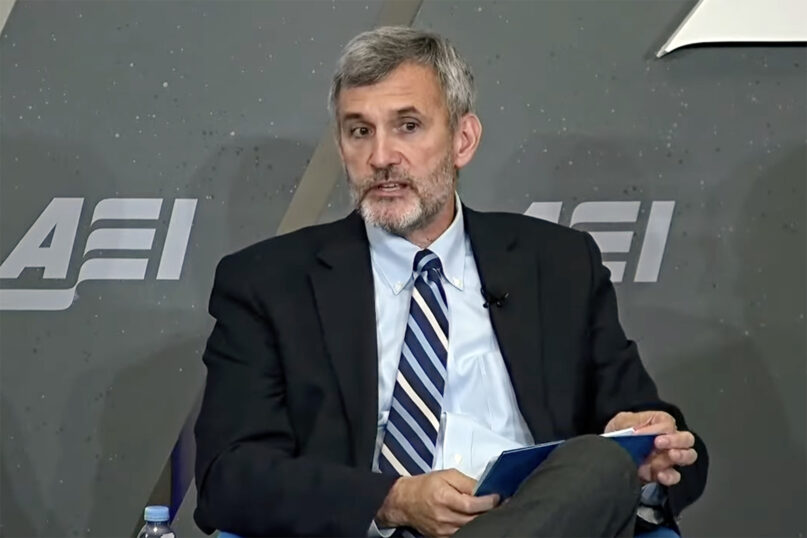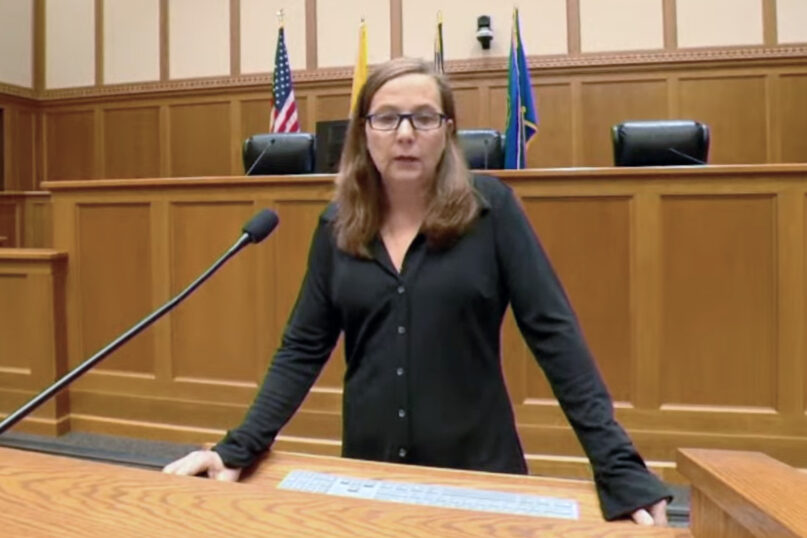(RNS) — The school choice movement has notched some dramatic wins over the past few years. In 2022, the U.S. Supreme Court ruled that states can’t exclude religious schools from tuition assistance programs, while programs that channel public funds into accounts that parents can spend on alternative education are on the rise.
“We are in a school choice moment, the school choice movement,” Nicole Stelle Garnett, a law professor at the University of Notre Dame who directs the university’s Education Law Project, said Thursday (Oct. 10). “After more than three decades of incremental growth, the tide has turned in the battle for parental choice and education.”
Garnett was speaking to advocates for religious schools at the American Enterprise Institute, a conservative think tank in Washington, who had gathered to discuss the movement’s next steps at an event called “Church and State: Reimagining Faith Communities’ Role in K–12 Education.”
Robert Pondiscio, an AEI senior fellow, told attendees that school choice measures had flourished in the wake of the COVID-19 pandemic, citing the “crisis of trust in public education, in institutions in general” caused partially by many parents’ feeling they could no longer depend on public schools.
Pondiscio said the “grievances and flash points” over COVID-19, race and gender all also pushed anxious parents away from the public school system. “Remote learning ripped the lid off” the “black box” that had been U.S. education so that parents could see what their children were being taught, he said.
“There is no such thing as a values neutral education,” said Pondiscio, repeating a common sentiment among the event’s speakers.

Robert Pondiscio speaks during the American Enterprise Institute’s “Church and State: Reimagining Faith Communities’ Role in K–12 Education” conference in Washington, D.C., Oct. 10, 2024. (Video screen grab)
Pondiscio said such culture war issues had long operated in education.“We invented the culture war in schools. It didn’t come for us. We created it,” he said.
Pondiscio celebrated the rapid spread of universal education savings account programs, which permit parents to opt out of the public school system and receive thousands of tax dollars for their children’s educational expenses, since they first went into effect in Arizona two years ago.
“The biggest thing that ESAs do is open the door for public dollars to be used for religious education, so, as you know, it’s functionally a voucher,” Pondiscio said.
While school choice has historically been thought of as a Catholic issue, it has also been championed by evangelical Christians. The AEI event included Black Protestant education activists, who called for greater religious schooling options for their community.

Kendall Qualls addresses the American Enterprise Institute’s “Church and State: Reimagining Faith Communities’ Role in K–12 Education” event in Washington, D.C., Oct. 10, 2024. (Video screen grab)
Some highlighted the cultural questions for their communities as particularly dire. “We have a moral and cultural collapse in the Black community,” said Kendall Qualls, president of TakeCharge and a former Republican candidate for office in Minnesota.
“In my lifetime, the culture has been shifted from a God-centered culture to a government-dependent culture,” Qualls said, explaining that a “catastrophic increase of nonmarried women” had resulted because welfare programs financially incentivized women to have children outside marriage.
Qualls argued that many schools are teaching “anti-American” messages and that private Christian schools such as TakeCharge’s Washington Academy could reverse that trend.
Several speakers blamed the notion of separation of church and state for impeding the expansion of public funding for religious schools. Though the notion is drawn from the U.S. Constitution’s establishment clause and backed by other writings of the founders, Ian Rowe, another senior fellow at AEI, told the crowd, “For too long, we’ve imagined the perceived separation of church and state mandated that these two cornerstones of our national life must be distinct and unrelated, but is that true?
“The actual words ‘separation of church and state’ never appear in the Constitution,” Rowe said.
But the Rev. Eugene F. Rivers III, founding director of the Seymour Institute for Black Church and Policy Studies, dismissed the question of the separation of church and state as “an elite debate” that fails to address the lives of disadvantaged Americans who need better options for education. “We must advance our interests independent of discussions among elites which have no empirical or political bearing on the lives of the poorest of the poor,” Rivers said.
Garnett said that, despite Carson v. Makin, the case that made tuition assistance available for religious schools, the courts are still deciding many questions about school choice, “including the range of regulations that the government may impose constitutionally on religious schools as a condition of participating in a private school choice program.”

Nicole Stelle Garnett remotely addresses the American Enterprise Institute’s event, Oct. 10, 2024. (Video screen grab)
She asked whether Carson v. Makin meant that those same nondiscrimination principles apply to current prohibitions of religious charter schools. Earlier in the week, attorneys from Notre Dame joined a legal team that appealed to the Supreme Court a decision by Oklahoma’s Supreme Court that a Catholic virtual charter school approved by the state’s charter board violated the establishment clause.
Critics of education savings accounts and vouchers say they divert needed funds from public education and weaken the system, while disproportionately benefiting families who already can afford to send their children to private schools.
But at the AEI event, speakers argued that religious schools and private school choice lead to better educational and life outcomes for students. “The research tells us the kids who participate in a private school choice program are more likely to stay in school, graduate from high school, graduate from college, get jobs, get married, stay married and become productive citizens,” said Garnett.
She argued that this is because “faith-based schools do more than educate minds. They form hearts and souls. They are full of adults who believe that the children entrusted to their care are made in the image and likeness of a loving God.”
The former superintendent of a Catholic school network said that “if we believe that faith is a critical component of human flourishing, then I think we need to broaden our investment in faith-based institutions that support our families and particularly those that form our young people.”
Irvin Leon Scott, a senior lecturer at Harvard University’s Graduate School of Education, argued that faith communities should be partnering with public schools, which he said would lead to better academic outcomes, especially for the most marginalized students; decreases in mental illness; and improvements in teacher “recruitment, satisfaction and longevity in the field.”
“I feel like one of the reasons we lose teachers is because they’ve lost connection to why they do this work,” Scott said. “Most of them do it for the money.”
But Jacqueline C. Rivers, executive director of the Seymour Institute for Black Church and Policy Studies, told the audience that even as charter and private schools grow, it is crucial to sustain public schools as well as private ones. “There are just not enough seats in charter and in religious schools and private schools of any kind for us to give up on the public schools,” she said.
“Are we going to walk out the door and leave them to the mercy of people who want to indoctrinate them with all kinds of ungodly ideas?” Rivers asked.
“We faith-based leaders and faith communities, we must fight for better public schools,” she said.

